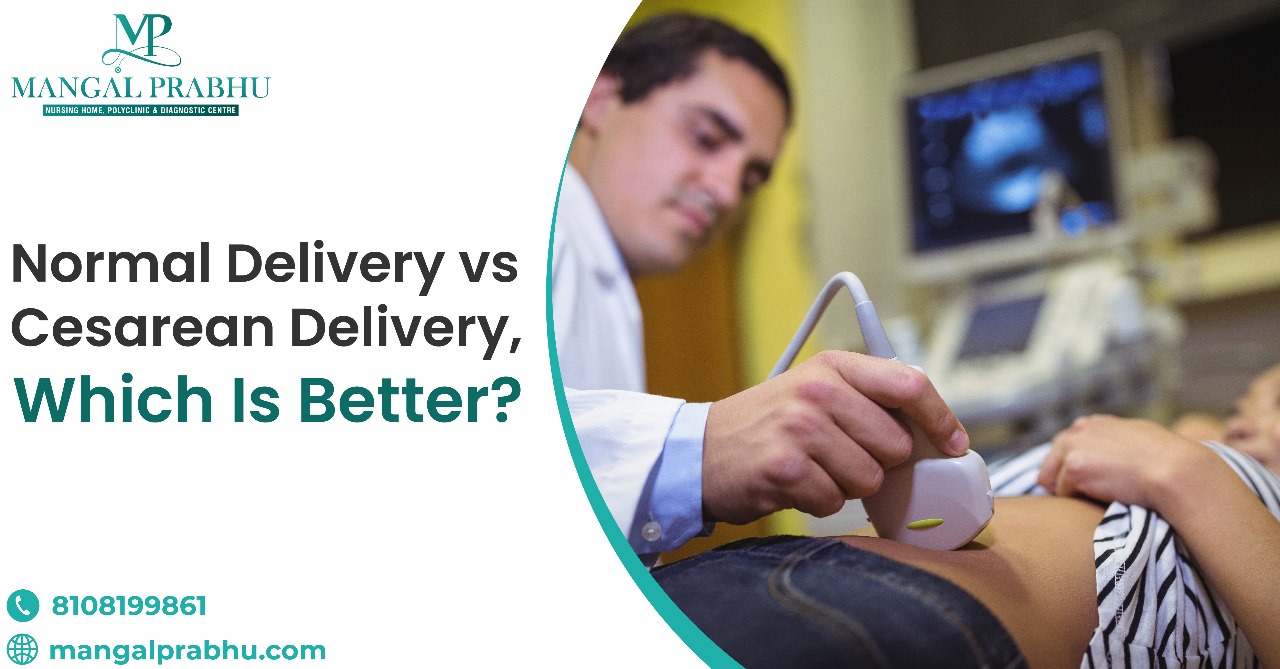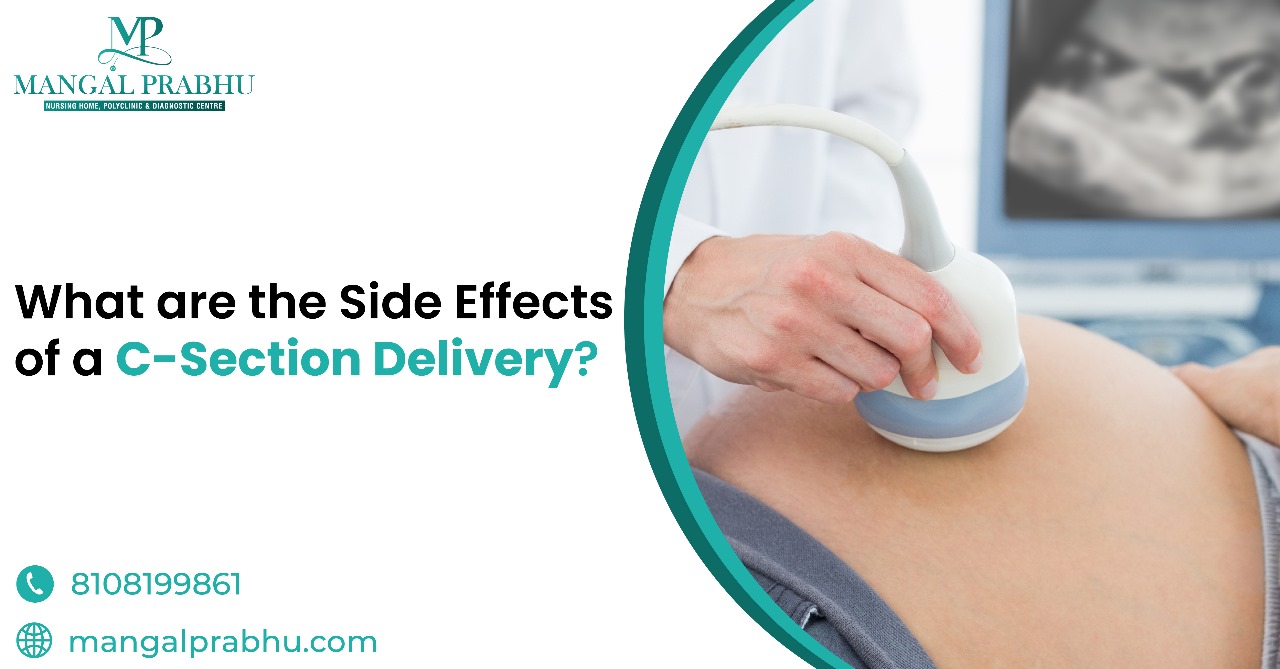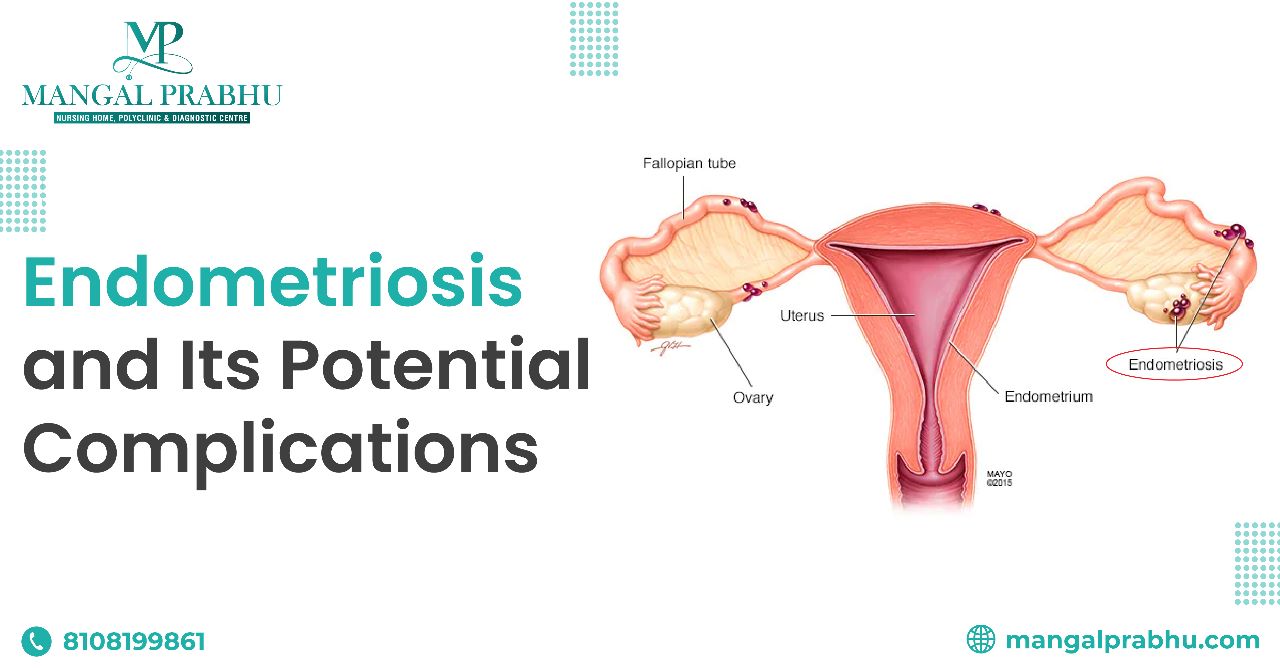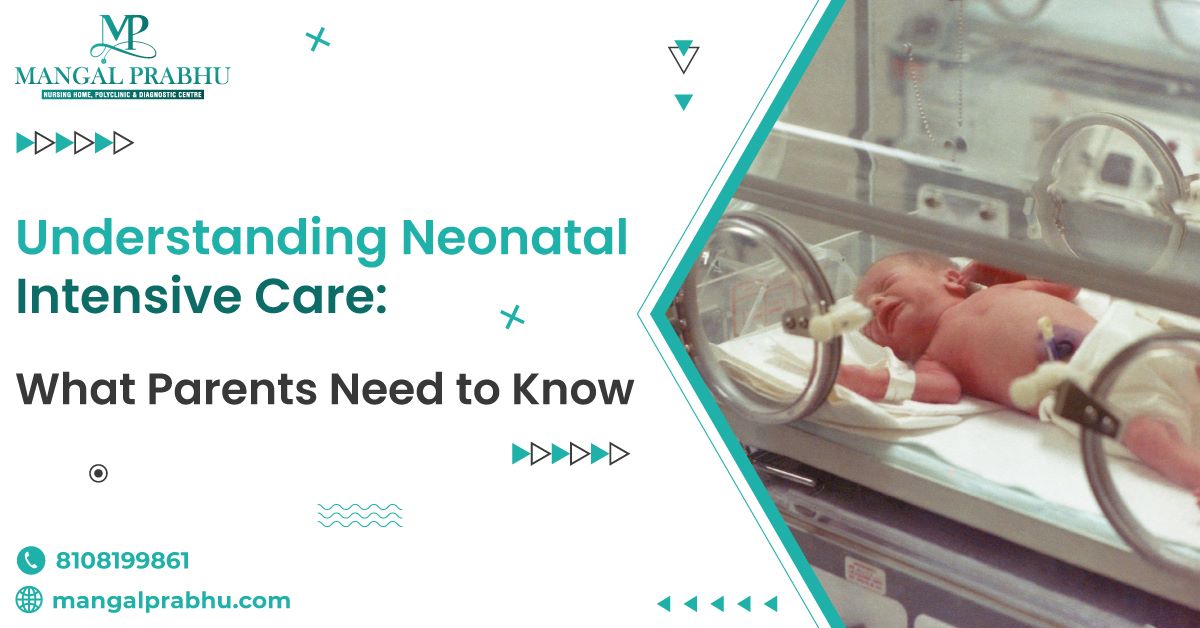
Normal Delivery Vs Cesarean Delivery, Which Is Better?
Childbirth is a life-altering experience for women. Regarding childbirth, doctors perform two primary methods: normal and cesarean. Both have advantages and disadvantages, and their choice often depends on various factors. In this article, with the guidance of a trusted Obstetrician in Navi Mumbai at Mangal Prabhu Hospital, you can learn the difference between these delivery procedures. You can also define and explore normal and cesarean deliveries’ benefits and health risks.
Definition of Normal Delivery vs. Cesarean Delivery
Normal Delivery
Normal delivery is also known as vaginal birth. It is the most natural way of bringing a baby into the world. It involves the baby passing through the birth canal, typically headfirst. Normal delivery can occur without medical interventions, but pain relief methods or assistance may sometimes be used.
Cesarean Delivery
It is often called a C-section. It is a surgical procedure where the baby is delivered through an incision in the mother’s abdomen and uterus. Doctors typically use it when complications or risks are associated with a vaginal birth.
Benefits of Normal Delivery:
- Mothers who deliver vaginally recover quicker than those who undergo C-sections. They can often resume their regular activities sooner.
- Since no abdominal surgery is involved, the infection risk is lower with normal delivery.
- Vaginal births often facilitate immediate skin-to-skin contact and bonding with the baby, making breastfeeding initiation easier.
Benefits of Cesarean Delivery:
- Cesarean deliveries are typically scheduled or planned, providing a controlled environment for the birth, which can be beneficial in certain medical situations.
- C-sections can reduce the risk of birth injuries, especially when the baby is in an abnormal position or size.
- Some women may prefer C-sections to avoid the potential pain and trauma associated with vaginal delivery.
Also Read: What Are The Side Effects Of A C-section Delivery?
Health Risks Associated with Normal Delivery:
- Vaginal births can result in perineal tears, which may require stitches and lead to discomfort during recovery.
- There is a risk of pelvic organ prolapse, where the pelvic organs shift from their normal position, causing discomfort and requiring further medical attention.
- Some women may experience urinary or fecal incontinence due to the strain placed on the pelvic floor during vaginal birth.
Health Risks Associated with Cesarean Delivery:
- C-sections involve surgery, which comes with inherent risks such as infection, bleeding, and anesthesia-related complications.
- Mothers who undergo C-sections have a more extended recovery period and may experience pain and discomfort at the incision site.
- Immediate skin-to-skin contact and bonding with the baby can be delayed in C-sections due to the surgical procedure.
Conclusion
Both normal and cesarean delivery have advantages and disadvantages. Their choice should be based on individual circumstances, including medical conditions, risks, and the mother’s and healthcare provider’s preferences. Expectant mothers must have open and thorough discussions with their obstetricians, such as those at Mangal Prabhu Hospital, a trusted maternity/pregnancy hospital in Navi Mumbai, to make the most informed decision.
Ultimately, there is no one-size-fits-all answer to whether normal or cesarean delivery is better. The well-being of both the mother and the baby should be the primary consideration, and the chosen delivery method should align with their unique needs and circumstances.

What Are The Side Effects Of A C-section Delivery?
C-section or Cesarean delivery is the birth of a baby through a surgical incision on the mother’s abdomen instead of delivering it through the vagina. You must need to visit a professional surgeon at a cesarean delivery hospital in Navi Mumbai to determine whether or not you are an ideal candidate for a vaginal delivery.
You might need a c-section if your baby’s heartbeat seems to be getting abnormal, your labor isn’t progressing, you have twins, a blockage in the birth canal, a prolapsed umbilical cord, etc. Women who had their first child delivered through C-section might be advised to have their future deliveries through an abdominal incision.
Short-Term Side Effects
Like any surgery, a C-section comes with its share of risks, including pain and discomfort for a few days following the surgery. It also leads to the risk of infection around the incision site. Infections occur when the bacteria spread inside the uterus.
If you notice unusual swelling, redness, and bleeding at the site of incision and excessive pain that won’t go away on its own, visit the pregnancy care hospital in Navi Mumbai to rule out the possibility of infection. High fever, fatigue, and a foul-smelling discharge are also common signs of bacterial infection.
Also Read: Understanding Vaginal Birth After Cesarean (VBAC)
Long-Term Side Effects
There can be long-term side-effects of c-section, such as blood clot formation in your veins or a surgical injury that can damage your bladder or bowel. Let’s check out a few common adverse effects of the C-section.
1. Reaction to Anesthesia:
Depending on the type of anesthesia given, you might experience a sore throat, nausea, vomiting, fever, and other complications.
2. Injury from the Surgery:
It’s a rare complication of a C-section delivery but is possible. A surgical injury can occur to the bladder, bowel, and other surrounding organs. It can also cause injury to the baby.
3. Complicated Future Pregnancies:
C-section increases the risk of complications in future pregnancies. Although it’s possible to deliver a child normally after one c-section, most doctors recommend c-sections for future deliveries. Frequent cesarean deliveries can also cause placenta accreta, placenta previa, and other such complications.
What Does Recovery from C-section Look Like?
Recovery might take anywhere between 4 and 6 weeks after the surgery, and longer depending on the complications in your pregnancy. You will be advised to avoid strenuous activities, heavy lifting, and physical exercises for the first few weeks.
You might experience slight cramping and bleeding from the incision site, but all these side effects are temporary and will eventually fade once you have recovered fully. You will be given painkillers for the first few days. You must refrain from having intercourse for a few weeks or until your surgeon gives you the green light.
Conclusion
If there are any complications in your pregnancy or there’s a risk to the baby or the mother’s health, the doctor might recommend an emergency c-section. This can produce the above-listed symptoms, although not everyone experiences complications. Ask your surgeon for more information about full recovery and post-partum care.

How Do A Woman Get An Urinary Tract Infection?
UTI is a common issue that can obstruct the overall body functioning of a woman. It can lead to numerous health conditions which can make the life of women challenging. However, it would be best to consult the experts from Mangal Prabhu Hospital, who have the best Urologist in Navi Mumbai. They offer the best treatment plan according to an individual’s needs and preferences.
Common Causes of UTI in Women
Women have to suffer from numerous health conditions in their lives more than men. One of the most common health conditions most women experience once in their life is Urinary Tract Infection. Urinary tract infections can be caused for various reasons, but one of the most common causes is bacteria entering the body through the urethra.
Bacteria enter the different parts of the urinary tract through the tube that carries urine from the bladder. The bacteria can also enter the body from the skin around the urethra or through the bloodstream. However, some of the most common causes of UTI in women are:
- Menopause
- Hormonal imbalance
- Anatomical factors
- Immunocompromised status
- Improper sexual activity
- Urinary tract obstruction
- Diabetes
Symptoms of UTI in Women
Some other symptoms demonstrate that you have a UTI. So let’s see the most common symptoms of UTI in women.
- Burning sensation or pain during or after peeing
- Lower back pain
- Urgent need to pee
- Cloudy or bad-smelling urine
- Pus or blood in the urine
- Craps, soreness, or pressure in the lower abdomen, back, or sides
- Chills
- Fever
- Fatigue
- Nausea and vomiting
Also Read: How To Recognize, Treat, And Prevent Urinary Tract Infections (UTI’s)?
Diagnosis and Treatment of UTI in Women
Mangal Prabhu Hospital is well-known as the best Urology Hospital in Navi Mumbai. They offer comprehensive treatment plans and diagnoses to treat urinary tract infections. Doctors usually diagnose UTIs according to the severity and symptoms of the condition. However, the best urologist recommends a urine test and performs a physical exam to check the presence of bacteria in the urinary tract area.
UTI can be treated very quickly with the antibiotics prescribed by doctors. However, the dosage and the type of medication also depend on the type of bacteria. Besides medication, a patient has to follow some prevention tips to get through the UTI.
Prevention of UTI in Women
UTI is a critical condition that can get back if one does not care for their health. However, there are various things that every woman should consider to prevent UTIs and other infections.
- Drink a lot of water
- Get proper diet
- Get regular workout
- Avoid holding pee
- Pee regularly
- Wipe the genital area from front to back
- Pee every time before and after sex
- Wear loose and breathable clothing
- Avoid using scented products
Conclusion: How to reduce the risk of UTI in Women
UTI is a critical bacterial infection that occurs in the urinary tract region, including the bladder, ureters, kidney, and urethra. It can easily be treated but also come back if one does not properly care for the genital area. However, the tips mentioned above are clinically proven to prevent the risk of developing UTI and help to keep the urinary tract area healthy and safe.

Symptoms Of Blood Cancer In Females
People with blood cancer usually experience symptoms very slowly, but it can spread in the body very quickly. However, if you encounter any sign of blood cancer, it would be best to acquire expert consultation from Mangal Prabhu Hospital, as they have the best hematologist in Navi Mumbai.
Definition of Blood Cancer
Blood cancer is a critical and life-threatening health-related issue that is often challenging to diagnose during the early stage. Blood cancer is a dangerous issue that involves the production of cancer-causing blood cells. The cancer-causing blood cells attack the healthy blood cells and interfere with the functioning of blood cells. Blood cancer can be categorized into various types.
Symptoms of Blood Cancer in Females
Symptoms of blood cancer are difficult to diagnose during its early stage, but some of the common symptoms of blood cancer in females are:
- Fever
- Pale skin fatigue
- Weight loss
- Easy bleeding or bruising
- Swollen lymph nodes
- Pain
- Frequent infection
However, symptoms of blood cancer in females may differ according to the different types. So let’s discuss the different types of blood cancer in females with its possible signs.
Signs of Leukemia
Leukemia is a common type of blood cancer that attacks white blood cells so they cannot fight against infection. Some of the signs of leukemia in females are:
- Easy nosebleeds
- Petechiae
- Dark urine
- Gum bleeding
- Jaundice
- Hepatomegaly
- Splenomegaly
Signs of Lymphoma
Lymphoma is when an abnormal cell attacks the lymph nodes so the body cannot fight potential infection again.
- Shortness of breath
- Fever
- Swollen lymph nodes
- Skin rash
- Cough
- Fatigue
- Unexplained weight loss
Signs of Myeloma
In myeloma, the blood cells affect plasma cells, so the body cannot produce antibodies. Some of the signs of myeloma in females are:
- Anemia
- Bone pain
- Infection
- Kidney issue
- Tingling or numbness
- Fatigue
- Weight loss
Diagnosis and Treatment
Mangal Prabhu is the best blood cancer hospital in Navi Mumbai that offers the best treatment plan and diagnoses the issue through a combination of tests. So, let’s see the variety of tests and treatment options for blood cancer.
Also Read: The Pros And Cons Of Chemotherapy: Is It Right For You?
Diagnosing Blood Cancer
- MRI
- CT scan
- Blood tests
- Bone marrow biopsy
Treatment Options
- Stem cell transplant
- Chemotherapy
- Radiation therapy
Coping with Blood Cancer
The treatment and diagnosis of blood cancer depends on the type and severity of the cancer. An individual has to take good care of their body besides having treatment. Patients require proper care and physical and emotional support from their friends and family to cope with blood cancer.
Managing Symptoms
Some of the ways to manage blood cancer symptoms are:
- Exercise
- Stay hydrated
- Eat healthy food and take proper rest
- Manage emotions
- Meditate and Yoga
Support Resources
Some support resources you can consider during treatment are:
- Joining a support group
- Talk to a therapist or take counseling
- Take care of mental and physical health
- Use relaxation techniques
Conclusion
Blood cancer is a severe condition, and its diagnosis is difficult. However, it would be best to consult the best hematologist when you experience any sign of blood cancer to get better treatment. When you opt for early diagnosis, it will help you to get through the blood cancer quickly and efficiently.

Foods To Avoid With Kidney Stones
Kidney stone pain is one of the most unbearable pains for a human being, and it may come in waves until the stone passes out of the body through urinary plumbing. Kidney stones can occur and grow for various reasons, but it would be best to consult the best kidney stone specialist in Navi Mumbai to get proper treatment before complications.
Moreover, kidney stone specialists from Mangal Prabhu Hospital suggested avoiding various food items to reduce the severity of the kidney stone and its pain. So let’s dive into the post to know the list of foods to avoid for kidney stones.
Overview of Kidney Stones and Why They Form
Kidney stone, also known as renal calculi, urolithiasis, or nephrolithiasis, is a hard deposit of slats and minerals that develops inside one or both kidneys. Kidney stones are excruciating, and they can also cause infection, bleeding, and other issues which obstruct the overall body functioning of a person. Kidney stones or calculi are when various substances like calcium, irc acid, or oxalate concentrate and form a stone or crystal in the kidney.
What Are The Foods To Avoid With Kidney Stones?
Every person suffering from kidney stones has to consider a proper diet and drink enough water to prevent kidney stones. Thus, it would be best to consult with the expert doctors of Mangal Prabhu Hospital, the Kidney Stone Hospital in Navi Mumbai, to offer the best treatment. However, some of the food items that one should avoid are as follow:
1) Food Contains High Sodium:
Food that contains high amounts of sodium makes urine more concentrated; thus, it would be best to avoid fast food, processed foods, salty snacks, and canned soup.
2) High Oxalates Food Items:
Items like sweet potatoes, rhubarb, seeds, nuts, and beets contain high oxalates that increase the calcium in the urine and produce kidney stones.
3) Foods High in Protein:
Dairy products, fish, red meat, etc, increase the risk of kidney stones.
Also Read: Preparing For Dialysis: What To Expect?
The Benefits of Avoiding Foods High in Oxalates, Sodium, and Protein
Food items that contain sodium, protein, and oxalates have a high risk of forming kidney stones as it increases the calcium level in the body. Avoiding these food items helps to reduce the risk of potential kidney stones. It also helps to dissolve the existing calculi and make urine less concentrated. Moreover, avoiding these food items helps reduce calcium in the urine and prevent kidney stones.
Tips on Eating a Kidney-Friendly Diet
If you want to take food that is good for kidney stones and helps prevent it, then following the given diet plan would be best.
- Drink plenty of water, lemonade, and coffee to ensure good urine volume.
- Eat fewer protein food items.
- Avoid high salt consumption.
- Eat less dietary calcium.
- Eat fruits and veggies like grapes, berries, carrots, celery, lettuce, tomatoes, banana, etc.
- Avoid fast foods, processed foods, and salty snacks.
- Eat lean protein food such as beans, poultry, and fish.
Conclusion
Avoiding high calcium, sodium, protein, and oxalates food helps prevent and reduce the risk of kidney stones. However, it would be best to follow the above tips to lower the risk of developing potential kidney stones. Moreover, these tips and avoiding food items help enhance the person’s overall body functioning and health.

Endometriosis and Its Potential Complications
What is Endometriosis?
Endometriosis is a medical condition, in which, tissues similar to those found on the uterine lining, grow outside your uterus. They start growing in different parts of your pelvic area, causing extreme discomfort, pain, heavy bleeding, and infertility. Endometrium refers to the tissue growth on the uterine walls.
It is these tissues that shed blood during your menstrual cycle. When you conceive, these tissues support the early growth of the fetus. However, in some cases, the tissues can develop in your abdomen, chest, and other parts outside your uterus. You must see a gynecologist in Navi Mumbai if you notice the below-listed symptoms.
Symptoms of Endometriosis
The symptoms of endometriosis may vary, but women usually report heavy periods, difficulty conceiving, pain during intercourse, and pain in the pelvic area. These symptoms might indicate other medical conditions as well. So, it’s best to check with your doctor to rule out the possibility of endometriosis. Here are some symptoms of endometriosis:
- Heavy period, extreme bleeding, and pelvic pain during menstruation
- Bloating
- Fatigue
- Nausea
- Spotting in-between periods
- infertility
The exact cause of endometriosis is not known. But, experts believe that retrograde menstruation and cellular metaplasia can contribute to the increased risk of endometriosis.
Also Read: Fibroid Removal Surgery: Understanding the Potential Side Effects
Diagnosis and Treatment of Endometriosis
Your healthcare provider will ask you questions about your medical history, the cases of endometriosis in your family, and your past pregnancies. They will evaluate your symptoms and conduct pelvic tests. If necessary, they will perform an ultrasound and an MRI to get an accurate image of your uterus and the internal reproductive organs.
If none of these work, your doctor might conduct a laparoscopic surgery to identify the underlying condition. Usually, laparoscopy is conducted for the diagnosis and treatment. The sample of the tissue is sent to the lab for further testing.
You can visit the endometriosis treatment hospital in Navi Mumbai to figure out the best possible treatment options for your condition. A few procedures that can help are:
- Hormone therapy
- Laparoscopic removal of the lesions
- Hysterectomy
Sometimes, endometriosis disappears on its own. The size of the patches shrinks and only a few of them remain. This usually happens after menopause, as the estrogen levels in your body drop around that time. Some patients need to work with their healthcare specialists to manage their condition. Regular appointments and over-the-counter prescriptions are necessary to prevent it from getting worse.
Potential Complications of Endometriosis
Endometriosis has painful symptoms and can cause heavy bleeding with blood clots. It can also lead to infertility. Some severe yet rare complications of endometriosis include difficulty emptying your bladder or passing bowels, blood in the urine, swollen kidneys, and shortness of breath. Get immediate help if you notice any of these symptoms during or in between your menstrual cycles.
Conclusion
The severity of the condition cannot be determined by the symptoms you experience. It’s possible that an endometriosis patient might have various patches of these tissues growing outside their uterus, but they experience mild to no pain. In some cases, patients with only a few patches of endometrium experience extreme symptoms.

What Are Some Treatments For Hypertension?
What is Hypertension?
Nearly half of adults worldwide have hypertension. Individuals with this condition have significant risk factors for various cardiovascular diseases. It can lead to serious health complications if you leave it unmanaged. Hence, you can also explore its causes, methods of diagnosis, and various available Hypertension Treatment in Navi Mumbai. This blog helps you learn more about hypertension.
Causes of Hypertension
Some factors can lead to the development of hypertension. Here are a few factors, including:
- Genetics
- Certain conditions like diabetes and sleep apnea
- Unhealthy lifestyle habits
Diagnosis of Hypertension
A General Physician in Navi Mumbai diagnoses hypertension by measuring blood pressure. They use a blood pressure cuff and a stethoscope or an automated blood pressure monitor. Consistently elevated blood pressure readings above the normal range may indicate hypertension.
Treatments for Hypertension
Mangal Prabhu Hospital aims to lower blood pressure levels and reduce the risk of associated complications using the following treatment for hypertension:
Lifestyle Changes
Lifestyle modifications play a crucial role in managing hypertension. These include:
- Emphasize fruits, whole grains, and low-fat dairy products. And limit sodium, saturated fats, and added sugars.
- Engage in moderate aerobic exercise for at least 150 minutes or vigorous exercise for 75 minutes per week.
- Achieve and maintain healthy body weight through healthy eating and physical activity.
- Practice stress management techniques such as deep breathing exercises, or meditation to reduce stress levels.
Also Read: Why It Is Important To Have Preventive Health Check-ups?
Medication
Sometimes, lifestyle changes alone may not be sufficient to manage hypertension. Doctors at Mangal Prabhu Hospital may prescribe medications to lower blood pressure levels. Commonly prescribed medications include:
- Diuretics
It promotes urine production, reducing fluid volume and lowering blood pressure.
- ACE Inhibitors and ARBs
It helps relax blood vessels and inhibit the effects of hormones that narrow blood vessels.
- Calcium Channel Blockers
It prevents calcium from entering the muscle cells of the heart and blood vessels, relaxing them and reducing blood pressure.
- Beta Blockers
It reduces the workload on the heart and blocks certain stress hormones to lower blood pressure.
Alternative Treatments
Complementary and alternative therapies may be used as adjunctive approaches to manage hypertension. These include:
- Acupuncture
It involves the insertion of thin needles into specific points on the body. It promotes relaxation and improves blood flow.
- Biofeedback
It helps individuals gain control over their body’s physiological responses, such as heart rate and blood pressure. It involves relaxation techniques and mental exercises.
- Mindfulness-Based Stress Reduction
It combines meditation, yoga, and other mindfulness practices to reduce stress.
Conclusion: Strategies for Managing Hypertension
Managing hypertension requires a comprehensive approach that includes lifestyle modifications, medication when necessary, and alternative treatments. Adapting a healthy lifestyle can significantly contribute to blood pressure control. Medications may be prescribed to lower blood pressure levels when lifestyle changes alone are insufficient. Moreover, alternative therapies like acupuncture can be beneficial as adjunctive treatments.
Individuals with hypertension must work closely with healthcare professionals. They will help them develop a personalized treatment plan considering their needs and medical history. By implementing these strategies, You can effectively manage hypertension and reduce the risk of associated complications.

Understanding Neonatal Intensive Care: What Parents Need to Know
What is Neonatal Intensive Care, and why is it essential?
Neonatal intensive care, or NICU, is a rare medical unit that provides 24/7 care for newborns with extreme medical conditions. It is a nursery in a hospital that provides round-the-clock care for ill or preterm babies. It has healthcare facilities that give special training to give your baby the best care. You can visit Neonatologists in Navi Mumbai as they provide these facilities.
What to Expect When Your Baby is in the NICU?
NICU Hospital in Navi Mumbai provides intensive care for newborns facing medical challenges. Having a baby in Neonatal Intensive Care can be a formidable experience for parents. Knowing what to expect during this time can help relieve anxiety and encourage parents to participate in their baby’s care actively. Things to expect when your baby is in NICU:
- A team of skilled healthcare professionals will actively and closely monitor your baby’s progress. The Neonatologist, NICU staff, and professionals will provide round-the-clock care and check if your baby’s needs are met.
- You can expect an explanation of medical procedures and equipment that is being used.
- Their environment will focus on infection control and safety, like using hygiene protocols to protect the infants.
- Your baby’s stay in the NICU depends on their medical condition and response to treatment. It’s better to celebrate the event and stay comforted knowing that NICU is providing care for your baby.
- The NICU treatment can be emotionally challenging for almost every parent. Reach out to the NICU staff for support groups where you can connect with families that are facing the same experience.
Also Read: NICU And PICU: What Is The Difference?
How to Support Your Baby During Their Stay?
Parents find it challenging to have a baby in the neonatal intensive care unit/NICU. Parents also play an essential role in their baby’s development during this time. The List below explains some of the ways to support your baby during their stay:
- To connect through touch, like skin-to-skin contact, also known as kangaroo care. Kangaroo care has shown benefits for premature infants. Gently pulling your baby against your chest promotes bonding.
- Be an advocate for your baby; creating soft sounds can provide comfort.
- Bring familiar items like small toys or swaddles. Maintain routine and establish connections even in hard times.
Tips for Dealing with the Stress of Having a Baby in the NICU
- Educate yourself about the baby’s condition
- Try to celebrate milestones
- Write your thoughts as a therapeutic outlet
- Have patience, and remember that the journey may have ups and downs, and healing takes time.
Long-Term Outlook for Babies in the NICU
Babies that received exceptional care in the NICU from Mangal Prabhu Hospital have a confirmed long-term outlook. Advanced and comprehensive interventions have improved chances of healthy growth and thriving in their future attempt.
Conclusion
Understanding NICU is essential for parents facing the challenging journey of having a baby in critical condition. Mangal Prabhu Hospital provides specialized medical care and a dedicated healthcare team to support newborns. Parents play an essential role in their baby’s recovery by being involved in their care.

Lifetime Precautions After a Hip Replacement
Generally, seniors undergo hip replacement surgery to improve mobility and reduce pain. If you know someone undergoing this surgery, you must ensure they know the lifetime precautions. The Hip Replacement Surgeon in Navi Mumbai educates its patient about lifetime precautions after their procedure. Individuals can ensure a successful and long-lasting outcome by following these precautions and taking care of the new joint. In this blog, you can explore the essential lifetime precautions after a hip replacement.
Understanding the Lifetime of a Hip Implant
Before learning about the lifetime precaution, let’s learn about the lifetime of the hip implant. These implants can vary in material and design. The lifespan of hip implants depends on multiple factors, such as their type and the individual’s lifestyle. On average, most hip replacements continue to function well even after ten years, and many can last a lifetime. You must consult with the surgeon from Orthopedic Hospital in Navi Mumbai about the specific characteristics of the implant and its expected longevity to ensure appropriate care.
Precautions to follow after Hip Replacement Surgery
People with hip replacement surgery should follow these precautions from Mangal Prabhu Hospital, including:
1. Crossing Legs and Twisting Movements
Avoid crossing legs and twisting movements, including pivoting on one leg and walking pigeon-toed, should be avoided to minimize the risk of dislocation. Side sleepers may find sleeping with a pillow between their legs beneficial to maintain proper alignment. It’s important to be mindful of these movements and make conscious efforts to protect the hip joint.
2. Bending Too Far
Excessive hip flexion can lead to dislocation, so seniors should avoid bending the hip joint beyond 90 degrees. Activities like putting on socks or shoes should be done with caution. Choosing appropriate seating, like chairs with the thighs parallel to the floor, helps maintain the correct angle. Tall individuals may need elevated cushions for chairs or toilet seats to prevent over-bending.
Also Read: How To Sleep After ACL Surgery?
3. Repetitive, High-Impact Activities
While exercise is essential for maintaining muscle tone and balance, certain activities can strain the hip implant excessively. Repetitive motions and high-impact exercises like running and jumping should be avoided. Instead, low-impact exercises such as swimming, yoga, and stationary biking are recommended to restore range of motion without risking damage to the implant.
4. Air Travel Considerations
If the hip implant contains metal, it may set off metal detectors at airport security checkpoints. Informing the TSA agent about the presence of a metal hip implant is advisable. Full-body scanners are usually more effective at detecting internal metal. Still, even if the alarm sounds, it’s typically resolved with a physical pat-down or electromagnetic wand screening to ensure safety.
Conclusion
By following the lifetime precautions after a hip replacement, individuals can maintain the integrity of their new joint and enjoy a fulfilling life. Seniors should prioritize low-impact exercises and be aware of air travel considerations. Elderly people also avoid excessive bending and twisting. It will contribute to the long-term success of hip replacement surgery. Consult healthcare professionals at Mangal Prabhu Hospital for personalized advice throughout the journey. They will help you manage your pain and prevent complications.

How to Find the Best Surgeon for Laparoscopic Hernia Surgery?
Finding the best surgeon for laparoscopic hernia surgery is a difficult step for having a successful and safe procedure. This blog offers valuable tips for finding the best hernia surgery surgeons in Navi Mumbai. Follow the right method and increase your successful treatment rate.
What is Laparoscopic Hernia Surgery?
Hernia surgery includes using a laparoscope, a thin fiber-optic instrument/tube equipped with a camera. The surgeon cuts the abandonment around the hernia site, and the laparoscopy is inserted through the cut to provide a clear view of the area. The hernia is then repaired using webbing and stitches by which the cuts are closed. You can visit Mangal Prabhu Hospital for this surgery as they have excellent professionals.
Benefits of Laparoscopic Hernia Surgery
Hernia surgery has become so popular Hernia Treatment in Navi Mumbai these days because of its benefits. Some of the benefits of hernia surgery include:
1. Reduction in Pain:
Small cuts in laparoscopic surgery result in less damage compared to general traditional open surgery
2. Faster Recovery:
Since there are small incisions in surgery, the recovery from surgery is way quicker than open surgery
3. Minor Scars:
Laparoscopic surgery doesn’t leave prominent scars, compared to open surgery, which has minimal scars
4. Chances of Fewer Infections:
Laparoscopic surgery reduces the chances of risk of wound infections and other complicated infections
5. Fewer Chances of Recurrence of Hernia:
Laparoscopic techniques have been associated with less rate of recurrence of hernia.
How to Choose a Surgeon for Laparoscopic Hernia Surgery
You must carefully consider a few factors to choose the best surgeon for laparoscopic hernia surgery. Here are some things to consider while looking for a surgeon for laparoscopic surgery.
i. Surgeon’s Qualifications:
Verify the surgeon’s qualifications and certification and check whether he has done training and has experience in laparoscopic hernia surgery.
ii. Experience:
You can inquire about the Surgeon’s Experience. A surgeon with multiple surgeries is likely to have better skills and experience. At Mangal Prabhu Hospital, you can find experienced surgeons who offer excellent treatment for hernias.
iii. Hospital Affiliations:
Hospital affiliations play an essential role. Look for hospitals with better facilities, advanced technologies, and high standards.
Also Read: How To Prevent Hernia?
Questions to Ask Your Laparoscopic Hernia Surgeon
While looking for a surgeon, you must ask him several questions, such as:
- How many laparoscopic hernia surgeries they had performed?
- What is their success rate in terms of hernia repair and recurrence?
- How do they determine if a patient is suitable for laparoscopic hernia surgery?
- What is their preferred technique for laparoscopic hernia repair, and why?
- What measures do they take to ensure patient comfort during and after the procedure?
Tips for Choosing the Right Surgeon
- Ask others’ opinions, as it is better to take others’ opinions while searching for a surgeon.
- Trust the surgeon as trusting them is necessary to find a good surgeon.
- You must ensure your surgeon is willing to listen to what you say to him.
- The location of surgeons’ practice and easy access to the hospital.
Conclusion
Choosing the best Laparoscopic Hernia Surgeon in Navi Mumbai is a hard decision that can affect your overall experience and the outcome of the surgery. You must take the time to research and choose the best hospital and best surgeon.
